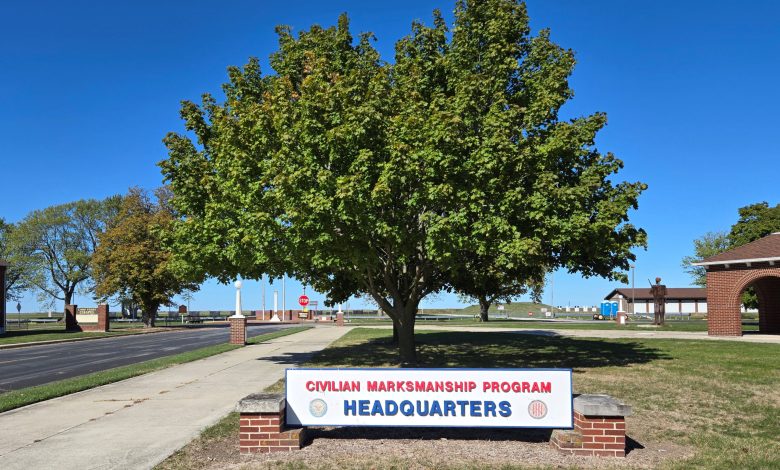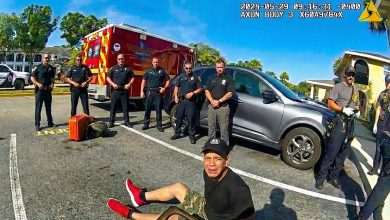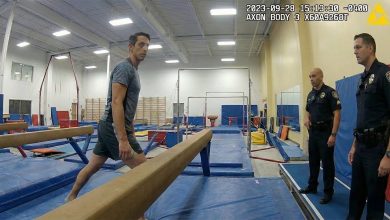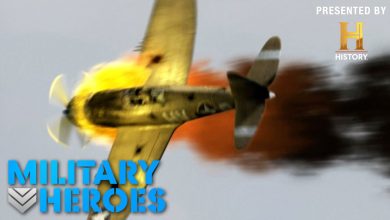A Pilgrimage to the CMP North Store

If you like military surplus weaponry, either as a shooter or a collector, then you’re probably familiar with the Civilian Marksmanship Program(CMP). In addition to promoting marksmanship and hosting the prestigious Camp Perry service rifle shoots, the CMP also runs the program where U.S. citizens can get surplus M1 Garands, 1911s and occasionally other rifles and gear. While that can be done through the mail, CMP also maintains three physical store locations. If you’re anywhere in the area of one, it’s worth a stop in.
Camp Perry, Ohio
As luck would have it, my wife and I had planned a weekend trip to Port Clinton, Ohio, at the beginning of October to meet up with a buddy of mine and his wife. We picked Port Clinton because it was in between our place around Pittsburgh and my buddy’s outside of Chicago. When I started looking at what there was to do in the area it hit me that Port Clinton is where Camp Perry was located. Which meant that the CMP North Store was there as well.
I’ve gotten a couple of 1911s through CMP in recent years, and I have my dad’s M1 Garand that he got from them in the pre-CMP Director of Civilian Marksmanship days. My father-in-law also got a Garand through that process years ago. While the mail order process works just fine, you basically get the luck of the draw, within the grade of weapon you select. Someone else is picking your rifle for you. If you go to the stores you can take your pick of the rifles on display and pick out the specific rifle you want. I always thought that would be great to at least see what they had to offer, so I added a stop in on our trip. My buddy was on board with checking out the store, but our wives had no interest. That was okay though because they found a nearby winery to keep themselves occupied.
The CMP Store is located on base at Camp Perry. Camp Perry is an Ohio National Guard training base and home to both an Ohio Air National Guard and Ohio Army National Guard unit. The rifle ranges at Camp Perry are also used by active duty for training and qualification. It’s located right on the shore of Lake Erie, and its ranges overlook the water.
Camp Perry is an open base with no gate guards and checkpoint, although the actual military units’ areas are located behind chain link fences and barbed wire. It’s a nice base that dates back to 1906. It was named after Commodore Oliver Hazard Perry who defeated the British in the Battle of the Great Lakes during the War of 1812.
Camp Perry was used as a training center for the Army during WW I and an artillery depot was built adjacent to the site around that time. In the 1920s the NRA built a Special Police School complete with “Hogans Alley” urban shooting course. During WW II the Special Police School was closed and the site was used as a POW camp for German and Italian prisoners.
The CMP North Store
The store itself is a short drive onto the base, and just past a small armor park with various tanks, APCs, helicopters and even a Nike missile on display. Being from Pittsburgh, I was familiar with the Nike sites that ringed the city during the Cold War. I’d been down in the old silos located on site at the Allegheny County Police Academy where I went through training and later taught. There’s also another Nike site that’s within a mile from my house. Not much is left of that one other than some buildings used by a University of Pittsburgh research center and the old base housing, which is now civilian rental units.
The CMP North store is located in a long brick building that also holds the Post Exchange. You walk into a small foyer with a window and then pass through a door into the store itself. It’s all one room and honestly not that big. It makes up for it with racks of rifles covering the floor, however.
When you first come in there’s a wall to the right with CMP swag like hats, shirts and bags, as well as modern shooting accessories. Right in front of you is a long table loaded with slings, bayonets, tech manuals, rifle stocks and other assorted surplus gear. More of the same is stacked underneath the table.
Left of that begins the racks of rifles. I was surprised to see the first rack was full of Model of 1917 rifles. Colloquially known as the “P17 Enfield” these were the substitute standard U.S. service rifle during the first World War. Made by Remington’s Eddystone plant and Winchester, these were adaptations of the British Pattern 14 rifle adapted to .30-06 for U.S. use to supplement the insufficient stocks of Model 1903 Springfields. The Model 1917 is a solid rifle and had a great reputation for reliability and accuracy.
The Model 1917s were likely returned from American Legion posts that had used them for parade and ceremonial use before exchanging them for other rifles, most likely M1 Garands. The rifles were carefully tagged with the conditions of the rifle itself and the bore condition. Most looked pretty good, and I was sorely tempted to grab one, but I did have one on my rack at home already.
It was interesting to see some chromed examples as well. From a purely military collectors standpoint, the chrome might be an abomination, but these parade rifles might make a nice addition to a collection that already has a good example or two in their original military trim. Their ceremonial use is part of their history, too. M1917s were listed at $1,000.
There was also a rack with a few M1903 Springfields. Like the 1917s, these would be returned from Legion posts. They were tagged and marked just like the 17s, and the only examples I saw were chrome parade rifles. Being that I inherited my dad’s gun collection, and he focused on Springfields, I was well stocked on these. It was still fun to see what they had available though. Parade rifles were listed at $700 if you were wondering.
I was surprised to see a handful of Krag-Jorgensen rifles on hand as well. Their provenance as parade rifles was obvious by the white painted stocks. The condition wasn’t great but again, the fact that they were used as ceremonial pieces for decades is all part of their history. These were listed at $1,350. Maybe that white paint would clean up and there’s some nice wood hiding underneath?
After this were numerous racks of M1 Garands, which has always been the star of the CMP program. These were divided by grade, ranging from Rack to Field to Service Grade. Like the other rifles they were carefully tagged as to manufacturer and condition. Different grades might reflect the use of replacement parts or new production barrels, stocks or other components. CMP also sells CMP Special M1s that had been rebuilt with a new production stock and handguard set with CMP cartouche, a new production barrel and new web sling. There was even a good sized rack of MK2MOD1 M1s chambered in 7.62x51mm NATO. In store there seemed to be some grading options beyond what you see if you’re ordering through their website.
They had Rack Grade Plus rifles and CMP Special Rack Grade models on the floor. Rack Grade rifles were $700. Rack Grade Plus were $1,050, while CMP Specials were $1,200. The 7.62 NATO MK2MOD1 M1s were a cool $1,600. This is more than they list for on the CMP website, but I think these were particularly nice examples. They were neat, but I prefer my M1s in .30-06. I think the other side of the rack from the MK2MOD1s must have been the Expert Grade rifles, but I was in a little bit of M1 overload and forgot to snap a picture of that to confirm. There are a lot of M1s to look through.
Depending if you want a rebuilt rifle to compete with or one with some character as a collectible, the choice is yours. Keep in mind that these are in fact service rifles though, so mismatched parts are common. Military arsenals were interested in keeping the weapons serviceable, not catering to collectors who wanted the elusive all matching-parts rifle almost a century after they were issued.
On the other side of the M1s was a smaller rack of Daisy M853 airguns used in competition. These could have come from an RTOC program or other military training program. I didn’t need an airgun, but I was vaguely tempted by one that had some neat markings on the stock. They were $125 each.
At the end of the day, I didn’t buy another rifle. I was sorely tempted to, just because I was there and had the opportunity to do so. And there were some great examples to be had. I know folks will look at the prices and note that they are not inexpensive. It’s a far cry from the $159 that my dad paid for his Garand back in the early 1980s for sure. However, the prices are still way under what you’d typically see at your local gun shop or gun show or on online sales sites. Plus you get to pick out the rifle you want, from the many that they have available.
If you do want to purchase a rifle while you’re at the CMP Store, you still need to meet all of the CMP purchase eligibility requirements, just like you would if you were ordering through their online program. That includes passing your typical background check and filling out your 4473, but you also need to show membership in an authorized club, military or law enforcement affiliation and a current weapons qualification. CMP spells out exactly what you need on their website so you know what you need well in advance of hitting the shop. It’s all part of the organization’s goals to promote qualified marksmanship amongst the American population.
While I didn’t get a rifle, I couldn’t walk away empty handed. I examined the book racks and surplus table and ended up getting a few tech manuals and books, as well as a number of slings from different eras for my assorted surplus rifles and clone rifle builds. Now that I know where the CMP North Store is though, and realize that it’s only about three and half hours from me, I may be back with some more planning. Either way, it was a unique stop and well with it if you’re a military small arms buff. The CMP stores really are a “must-do” visit if you’re anywhere in the area of one.
For more information on the CMP, their physical and online stores and their M1 and 1911 programs, check out the CMP website.
Read the full article here








